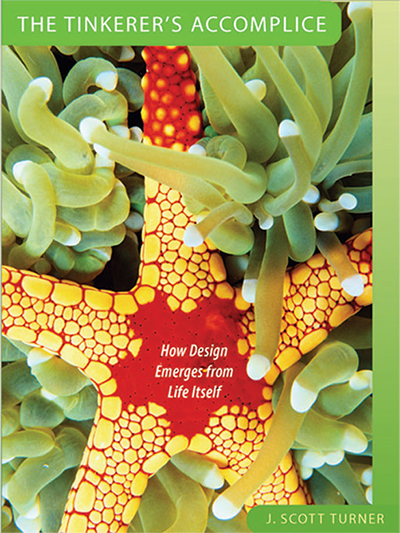Paper wasp building its nest

Visit my author's page at amazon.com
The Tinkerer's Accomplice. How Design Emerges from Life Itself was published in 2007 by Harvard University Press. It argues that life is a designed phenomenon, and that the source of the design is a fundamental property of life, homeostasis. This concept was first articulated by the French physiologist and contemporary of Charles Darwin, Claude Bernard. I expand on Bernard's idea to show how it modifies form in a way that matches form with function: the basis of good design.
The Tinkerer's Accomplice at Amazon.com
Selected blurbs
Impressively wide ranging and knowledgeable about the animal’s world, Scott Turner speaks so clearly that none who listen will fail to understand. Is evolution of novelty due to random mutation, or chance, or to design? Is the behavior of the being determined by his inherited DNA nucleotide sequence? Or has our environment been created by myriad, astoundingly diverse pre-human, non-human purposeful engineers? Read, and find out."
Lynn Margulis, University of Massachusetts at Amherst, Author of Symbiotic Planet
"Physiologists have traditionally had little to say about evolution, but in this important book, Scott Turner brings his deep understanding of the workings of termite mounds, circulatory systems, brains, and other complex internal environments to bear on the role of design in evolution.”
Geerat Vermeij, University of California at Davis
"Turner reminds us that, to have a coherent science of biology, we must begin by considering how life functions at the level of the organism. Genes matter, but in the end they play only an indirect role. Physiologists have too rarely viewed their subject in a wider evolutionary and environmental context, an omission Turner does much to remedy. An active investigator of long experience, he illuminates concepts with examples from the experimental trenches, from cellular systems to data from organisms in the field. Whether or not one agrees with him, his case for the necessity of such a synthesis remains persuasive.”
Steven Vogel, Duke University, author of Biomechanics: Life’s Physical World
Copyright 2016. J S Turner. All rights reserved




